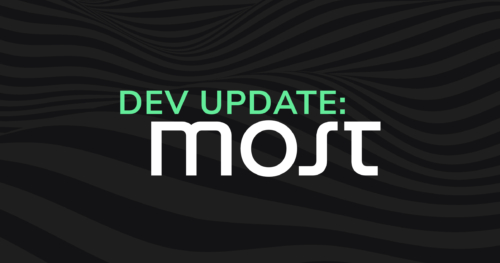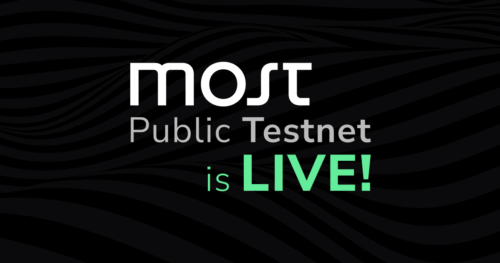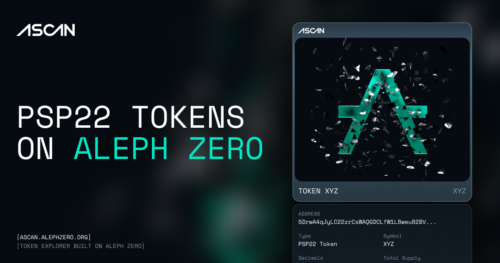Blockchain Adoption in the Dominican Republic
Oct 13, 2021

Continuing our series on emerging economies, we lock our sights on the Dominican Republic — a country primed to benefit from the adoption of blockchain technology.
As mentioned in our earlier blog post on blockchain adoption, Latin America is a powder-keg for novel technological solutions that is ready to explode! As we speak, numerous initiatives and startups have already taken steps to put their foot in the door. These initiatives normalize blockchain activity at institutional levels by taking advantage of the general public’s awareness of cryptocurrencies. Aleph Zero and Necker Ventures have also been eyeing the region, particularly the Dominican Republic. We see the nation as a potential stage for implementing infrastructure projects that can significantly benefit the country.
The Nuts and Bolts of the Dominican Republic
The Dominican Republic has a lot going for it as an emerging economy. It is the largest free economy in the Caribbean. Notably, it is the favorite destination in the Caribbean for investors from abroad who are looking for a place to direct their capital. In recent years, the country has also shifted its economic profile, moving away from agricultural products into more industrial ventures. Including a shift to gold and Ferro-nickel production. The country possesses strong trade partnerships with the United States of America and is subject to low inflation rates. Hampering this relative stability are several infrastructure and institutional challenges.
However, it’s not all roses — and several barriers stand in the way of the country reaching its full potential. One of the more significant problems is energy security caused by an over-reliance on energy imports. Internally, the country suffers from poor infrastructure that results in numerous outages and blackouts. Additionally, policies on greenhouse gas emissions have resulted in generous incentives for investors in the renewable energy sector, with the caveat that the government stops short of buying this electricity.
Institutional Inefficiencies Slowing Innovation
Despite being the fastest-growing economy in the Caribbean, the Dominican Republic faces numerous institutional challenges that need solving. The problems faced by the country are similar to those found in other developing nations, with institutional inefficiencies topping the list of concerns. Areas that need a dramatic overhaul are, among others, the tax system. An efficient tax system is the government’s lifeline. When properly managed, it can bring incredible growth for the citizens of a country. A smoothly running tax system can impact both social and economic outcomes.
Taxation in the Dominican Republic is notable for its various peculiarities. These idiosyncrasies have proved opaque for both investors and the average citizen. The tax base is very narrow, as multiple deductions and exemptions significantly cut into the collected revenue. For example, in 2020, only 4.8 percent of the GDP can be accounted for tax expenditures, with a whopping 2.5 percent associated with value-added tax (VAT) exemptions. Additionally, the complexity of the tax system has resulted in a situation where only large corporations can efficiently navigate, taking advantage of the various deductions and exemptions that exacerbate the problem further.
Tax evasion is another significant problem. In 2017 tax evasion cost the government 9.5 percent of GDP. This loss of revenue is consequential in all areas of taxation. Tax evasion for VAT is estimated at 44%, whereas personal income tax (PIT) and corporate income tax (CIT) is at 57% and 62%. Because VAT is the largest source of governmental revenue, tax evasion in this area significantly impacts public finances. Unfortunately, over 5.8% of GDP is being lost year to year!
The Dominican Republic and the Remittance Economy
The Dominican Republic receives a significant amount of remittances from abroad, the sum total of which is around 8% of the GDP. This is double the world average for most emerging economies and has fortunately helped the Dominican Republic weather the storm of the COVID-19 pandemic. The associated financial crisis did significant damage to the nation’s economy. The economy shrunk by 6.7% during 2020. Fortunately, due to a robust inflow of remittances, the dent was not as severe as predicted. This resulted in a healthy rebound for the economy.
Can Blockchain Technology Solve the Challenges of the Dominican Republic?
Blockchain technology is not a panacea for every challenge in the Dominican Republic. The technology has specific applications that can considerably benefit the country. What blockchain technology brings to the table is a very precise skill set. This skill set lends itself to solving some of the country’s issues. State institutions can greatly benefit from the immutable and transparent networks that blockchains represent. The technology can also provide a public database that will help average citizens. This database can be used for energy management, streamlining the tax system, transferring money, and perhaps even voting.
Blockchain and the Energy Market
The energy market is one of the most promising sectors for blockchain adoption, after the financial market. As energy production becomes more decentralized, private enterprises play a more critical role every passing year. The public nature of blockchain databases is ideal for managing and archiving the vast numbers of transactions conducted between entities in this sector. Switching over to this technological innovation could assist individuals in becoming more in control of their energy consumption. It will also allow those who produce energy to sell their energy on the open market. This use case for blockchain technology will result in smarter energy consumption and also can incentivize green energy solutions.
Some of the more far-reaching ideas involving blockchain adoption and the energy market include applying smart contracts to facilitate more ecologically sustainable behaviors. Smart contracts can introduce streamlined systems for managing carbon emissions and trading carbon assets between corporations. Storing information on immutable ledgers also makes it public knowledge. This will incentivize businesses to take their ecological footprint seriously, but also help boost marketing and public relations efforts.
Building a Green Society
Besides making it easier for corporations to engage more dynamically with climate change, smart contracts can also make it easier for citizens to build greener communities. The Dominican Republic plans to generate about 25% of its energy using renewables by 2025 and plans to become carbon neutral by 2050. One of the obstacles towards adopting renewable energy is a lack of confidence by citizens. We can associate this sentiment with the intermittent nature of renewables and their dependence on weather conditions. As energy storage becomes more efficient and transferring energy on P2P grids becomes commonplace, this will assuage many of the fears these novel technologies arouse. It will be possible for private citizens to trade electricity on the blockchain and work around the technological limitations of renewable energy sources without fear of being ‘left in the dark.’
Blockchain and the Tax System
In this article, we have briefly looked at the issues plaguing the tax system in the Dominican Republic. Fortunately, there are numerous benefits for both the government and taxpayers that blockchain technology can introduce. One of the most significant applications is in reducing tax evasion. By design, blockchain records every transaction on the network. This makes it ideal for applying the correct taxation to any transfer of goods. Moreover, with MPC-based technology, it’s possible to give all parties control over the calculations but prevent a single party from accessing the information. Introducing these solutions will result in transparent, provable calculations.
This can prove invaluable for the nation’s financial system and provoke an influx of capital. These assets, in turn, will help solve many of the nation’s infrastructure problems.
A benefit for citizens is a transparent record of public finances. Filling out complex tax forms can also be simplified through the adoption of secure, blockchain-based services. These services can offer transparency and also display ecological benefits through the reduction of paper waste and bureaucracy.
Blockchain Facilitating Effective Transfer of Financial Assets
As mentioned above, the healthy inflow of remittances into the Dominican Republic makes up a significant portion of the country’s GDP. Blockchain technology has entered this sector, offering competitive transfer fees to more traditional forms of sending funds. A more recent innovation is the pilot program spearheaded by the Inter-American Development Bank (IDB) and Citi Innovation Labs to create a competitive blockchain-based service to transfer funds from the United States to the Dominican Republic. Considering that 80% percent of all remittances entering the Dominican Republic originate from the United States, this is a crucial step forward by institutions — to address the need for more efficient methods of transferring funds between economies.
So, Where Do We Stand?
The Dominican Republic has thus far not introduced any measures that would either constrain or incentivize blockchain and cryptocurrency adoption. In a statement issued in 2017, the government proclaimed that the only legally accepted form of payment would be the national currency. At the same time, though, trading cryptocurrencies is legal with the caveat that one does so at one’s own risk. This regulatory ‘grey zone’ has a silver lining to it as it does open up the possibility for dialogue between private enterprise and government. Aleph Zero sees incredible potential for this dialogue. It will open up a new and exciting frontier of introducing blockchain technology to regulatory bodies and facilitate broader social recognition.


